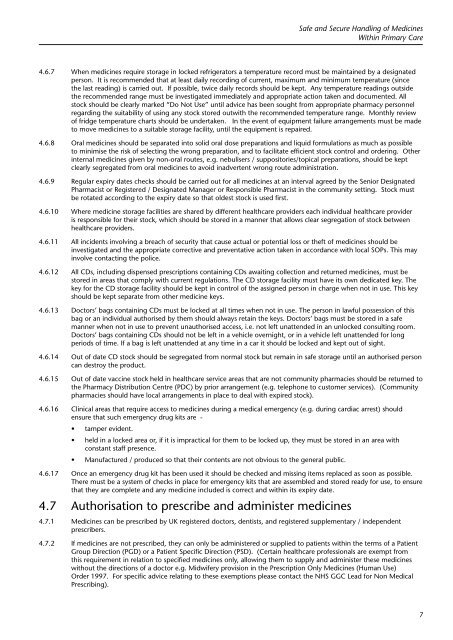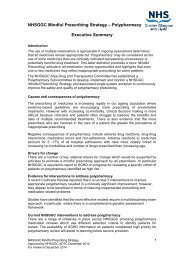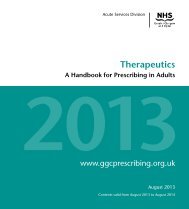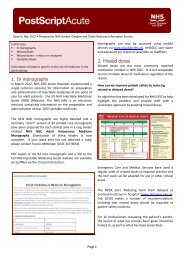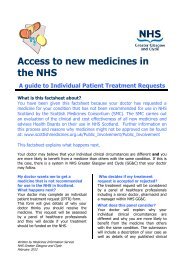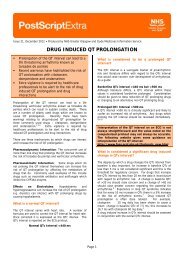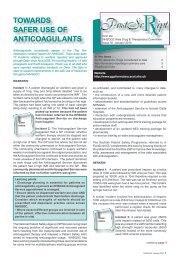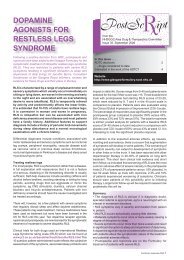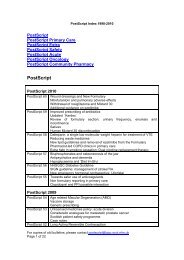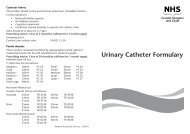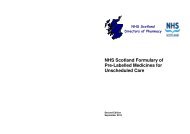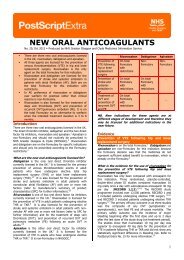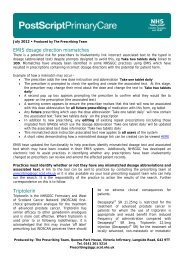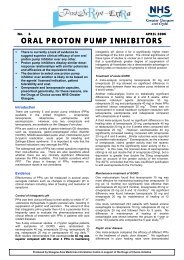Safe and Secure Handling of Medicines Within ... - GGC Prescribing
Safe and Secure Handling of Medicines Within ... - GGC Prescribing
Safe and Secure Handling of Medicines Within ... - GGC Prescribing
You also want an ePaper? Increase the reach of your titles
YUMPU automatically turns print PDFs into web optimized ePapers that Google loves.
<strong>Safe</strong> <strong>and</strong> <strong>Secure</strong> H<strong>and</strong>ling <strong>of</strong> <strong>Medicines</strong><br />
<strong>Within</strong> Primary Care<br />
4.6.7 When medicines require storage in locked refrigerators a temperature record must be maintained by a designated<br />
person. It is recommended that at least daily recording <strong>of</strong> current, maximum <strong>and</strong> minimum temperature (since<br />
the last reading) is carried out. If possible, twice daily records should be kept. Any temperature readings outside<br />
the recommended range must be investigated immediately <strong>and</strong> appropriate action taken <strong>and</strong> documented. All<br />
stock should be clearly marked “Do Not Use” until advice has been sought from appropriate pharmacy personnel<br />
regarding the suitability <strong>of</strong> using any stock stored outwith the recommended temperature range. Monthly review<br />
<strong>of</strong> fridge temperature charts should be undertaken. In the event <strong>of</strong> equipment failure arrangements must be made<br />
to move medicines to a suitable storage facility, until the equipment is repaired.<br />
4.6.8 Oral medicines should be separated into solid oral dose preparations <strong>and</strong> liquid formulations as much as possible<br />
to minimise the risk <strong>of</strong> selecting the wrong preparation, <strong>and</strong> to facilitate efficient stock control <strong>and</strong> ordering. Other<br />
internal medicines given by non-oral routes, e.g. nebulisers / suppositories/topical preparations, should be kept<br />
clearly segregated from oral medicines to avoid inadvertent wrong route administration.<br />
4.6.9 Regular expiry dates checks should be carried out for all medicines at an interval agreed by the Senior Designated<br />
Pharmacist or Registered / Designated Manager or Responsible Pharmacist in the community setting. Stock must<br />
be rotated according to the expiry date so that oldest stock is used first.<br />
4.6.10 Where medicine storage facilities are shared by different healthcare providers each individual healthcare provider<br />
is responsible for their stock, which should be stored in a manner that allows clear segregation <strong>of</strong> stock between<br />
healthcare providers.<br />
4.6.11 All incidents involving a breach <strong>of</strong> security that cause actual or potential loss or theft <strong>of</strong> medicines should be<br />
investigated <strong>and</strong> the appropriate corrective <strong>and</strong> preventative action taken in accordance with local SOPs. This may<br />
involve contacting the police.<br />
4.6.12 All CDs, including dispensed prescriptions containing CDs awaiting collection <strong>and</strong> returned medicines, must be<br />
stored in areas that comply with current regulations. The CD storage facility must have its own dedicated key. The<br />
key for the CD storage facility should be kept in control <strong>of</strong> the assigned person in charge when not in use. This key<br />
should be kept separate from other medicine keys.<br />
4.6.13 Doctors’ bags containing CDs must be locked at all times when not in use. The person in lawful possession <strong>of</strong> this<br />
bag or an individual authorised by them should always retain the keys. Doctors’ bags must be stored in a safe<br />
manner when not in use to prevent unauthorised access, i.e. not left unattended in an unlocked consulting room.<br />
Doctors’ bags containing CDs should not be left in a vehicle overnight, or in a vehicle left unattended for long<br />
periods <strong>of</strong> time. If a bag is left unattended at any time in a car it should be locked <strong>and</strong> kept out <strong>of</strong> sight.<br />
4.6.14 Out <strong>of</strong> date CD stock should be segregated from normal stock but remain in safe storage until an authorised person<br />
can destroy the product.<br />
4.6.15 Out <strong>of</strong> date vaccine stock held in healthcare service areas that are not community pharmacies should be returned to<br />
the Pharmacy Distribution Centre (PDC) by prior arrangement (e.g. telephone to customer services). (Community<br />
pharmacies should have local arrangements in place to deal with expired stock).<br />
4.6.16 Clinical areas that require access to medicines during a medical emergency (e.g. during cardiac arrest) should<br />
ensure that such emergency drug kits are -<br />
• tamper evident.<br />
• held in a locked area or, if it is impractical for them to be locked up, they must be stored in an area with<br />
constant staff presence.<br />
• Manufactured / produced so that their contents are not obvious to the general public.<br />
4.6.17 Once an emergency drug kit has been used it should be checked <strong>and</strong> missing items replaced as soon as possible.<br />
There must be a system <strong>of</strong> checks in place for emergency kits that are assembled <strong>and</strong> stored ready for use, to ensure<br />
that they are complete <strong>and</strong> any medicine included is correct <strong>and</strong> within its expiry date.<br />
4.7 Authorisation to prescribe <strong>and</strong> administer medicines<br />
4.7.1 <strong>Medicines</strong> can be prescribed by UK registered doctors, dentists, <strong>and</strong> registered supplementary / independent<br />
prescribers.<br />
4.7.2 If medicines are not prescribed, they can only be administered or supplied to patients within the terms <strong>of</strong> a Patient<br />
Group Direction (PGD) or a Patient Specific Direction (PSD). (Certain healthcare pr<strong>of</strong>essionals are exempt from<br />
this requirement in relation to specified medicines only, allowing them to supply <strong>and</strong> administer these medicines<br />
without the directions <strong>of</strong> a doctor e.g. Midwifery provision in the Prescription Only <strong>Medicines</strong> (Human Use)<br />
Order 1997. For specific advice relating to these exemptions please contact the NHS <strong>GGC</strong> Lead for Non Medical<br />
<strong>Prescribing</strong>).<br />
7


